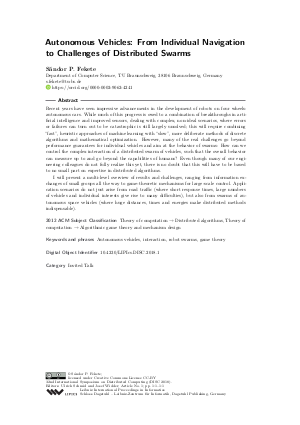Autonomous Vehicles: From Individual Navigation to Challenges of Distributed Swarms (Invited Talk)
Author
Sándor P. Fekete 
-
Part of:
Volume:
32nd International Symposium on Distributed Computing (DISC 2018)
Part of: Series: Leibniz International Proceedings in Informatics (LIPIcs)
Part of: Conference: International Symposium on Distributed Computing (DISC) - License:
 Creative Commons Attribution 3.0 Unported license
Creative Commons Attribution 3.0 Unported license
- Publication Date: 2018-10-04
File

PDF
LIPIcs.DISC.2018.1.pdf
- Filesize: 161 kB
- 1 pages
Document Identifiers
Subject Classification
ACM Subject Classification
- Theory of computation → Distributed algorithms
- Theory of computation → Algorithmic game theory and mechanism design
Keywords
- Autonomous vehicles
- interaction
- robot swarms
- game theory
Metrics
- Access Statistics
-
Total Accesses (updated on a weekly basis)
0Document
0Metadata
Abstract
Recent years have seen impressive advancements in the development of robots on four wheels: autonomous cars. While much of this progress is owed to a combination of breakthroughs in artificial intelligence and improved sensors, dealing with complex, non-ideal scenarios, where errors or failures can turn out to be catastrophic is still largely unsolved; this will require combining "fast", heuristic approaches of machine learning with "slow", more deliberate methods of discrete algorithms and mathematical optimization. However, many of the real challenges go beyond performance guarantees for individual vehicles and aim at the behavior of swarms: How can we control the complex interaction of a distributed swarm of vehicles, such that the overall behavior can measure up to and go beyond the capabilities of humans? Even though many of our engineering colleagues do not fully realize this yet, there is no doubt that this will have to be based to no small part on expertise in distributed algorithms. I will present a multi-level overview of results and challenges, ranging from information exchanges of small groups all the way to game-theoretic mechanisms for large-scale control. Application scenarios do not just arise from road traffic (where short response times, large numbers of vehicles and individual interests give rise to many difficulties), but also from swarms of autonomous space vehicles (where huge distances, times and energies make distributed methods indispensable).
Cite As Get BibTex
Sándor P. Fekete. Autonomous Vehicles: From Individual Navigation to Challenges of Distributed Swarms (Invited Talk). In 32nd International Symposium on Distributed Computing (DISC 2018). Leibniz International Proceedings in Informatics (LIPIcs), Volume 121, p. 1:1, Schloss Dagstuhl – Leibniz-Zentrum für Informatik (2018)
https://doi.org/10.4230/LIPIcs.DISC.2018.1
BibTex
@InProceedings{fekete:LIPIcs.DISC.2018.1,
author = {Fekete, S\'{a}ndor P.},
title = {{Autonomous Vehicles: From Individual Navigation to Challenges of Distributed Swarms}},
booktitle = {32nd International Symposium on Distributed Computing (DISC 2018)},
pages = {1:1--1:1},
series = {Leibniz International Proceedings in Informatics (LIPIcs)},
ISBN = {978-3-95977-092-7},
ISSN = {1868-8969},
year = {2018},
volume = {121},
editor = {Schmid, Ulrich and Widder, Josef},
publisher = {Schloss Dagstuhl -- Leibniz-Zentrum f{\"u}r Informatik},
address = {Dagstuhl, Germany},
URL = {https://drops.dagstuhl.de/entities/document/10.4230/LIPIcs.DISC.2018.1},
URN = {urn:nbn:de:0030-drops-97904},
doi = {10.4230/LIPIcs.DISC.2018.1},
annote = {Keywords: Autonomous vehicles, interaction, robot swarms, game theory}
}
